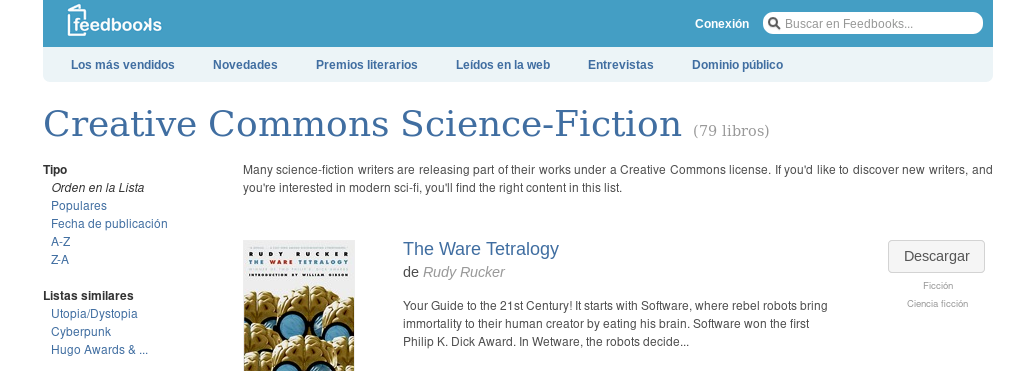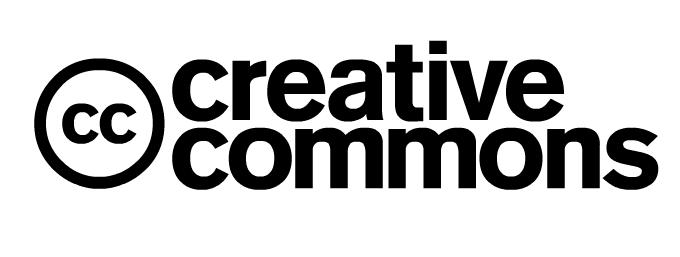

Ya os he hablado de Creative Commons, como si no lo conocierais ya de antes, y puedo ir al grano sin introducciones sobre ello. Ahora que emerge con fuerza el libro electrónico, también lo hacen las tiendas de libros electrónicos. Por ahora la gente sigue siendo algo reacia a pagar, no ayuda nada los desorbitados precios de los eBooks.
Un gran filón de este tipo de tiendas (y de los usuarios de libro electrónico) son las obras que ya han pasado a dominio público, y las obras que legalmente están disponibles de manera libre (y gratuita) en la red. Hoy voy a hablar de este último caso.
Hay muchos autores, cada vez más, que ponen sus obras a disposición del público con licencias Creative Commons. Yo mismo he reseñado aquí dos de ellas: My own kind of freedom, de Steven Brust y Little Brother de Cory Doctorow.
Si les interesa como a mi las obras de ciencia ficción y fantasía van a sacarle partido a dos recopilaciones de Feedbooks, un servicio de publicación y distribución de libros.
- 96 obras de ciencia ficción con licencia Creative Commons.
- 19 obras de fantasía con licencia Creative Commons.
Incluye obras de Cory Doctorow, Benjamin Rosenbaum, Peter Watts o Tom Maddox entre muchos otros.
No cometan el error de pensar que estas personas comparten su obra de este modo porque no serían capaces de venderlos de otra manera. He destacado varios autores que de cualquier modo ya venden una gran cantidad de esos libros que también comparten gratuitamente. Puede parecer ilógico o al menos curioso, les resumo los argumentos de Cory Doctorow al respecto (las negritas son mías):
Giving away ebooks gives me artistic, moral and commercial satisfaction. The commercial question is the one that comes up most often: how can you give away free ebooks and still make money?
For me -- for pretty much every writer -- the big problem isn't piracy, it's obscurity (thanks to Tim O'Reilly for this great aphorism). Of all the people who failed to buy this book today, the majority did so because they never heard of it, not because someone gave them a free copy. Mega-hit best-sellers in science fiction sell half a million copies -- in a world where 175,000 attend the San Diego Comic Con alone, you've got to figure that most of the people who "like science fiction" (and related geeky stuff like comics, games, Linux, and so on) just don't really buy books. I'm more interested in getting more of that wider audience into the tent than making sure that everyone who's in the tent bought a ticket to be there.
[...]
The good news (for writers) is that this means that ebooks on computers are more likely to be an enticement to buy the printed book (which is, after all, cheap, easily had, and easy to use) than a substitute for it. You can probably read just enough of the book off the screen to realize you want to be reading it on paper.
So ebooks sell print books. Every writer I've heard of who's tried giving away ebooks to promote paper books has come back to do it again. That's the commercial case for doing free ebooks.
Now, onto the artistic case. It's the twenty-first century. Copying stuff is never, ever going to get any harder than it is today (or if it does, it'll be because civilization has collapsed, at which point we'll have other problems). Hard drives aren't going to get bulkier, more expensive, or less capacious. Networks won't get slower or harder to access. If you're not making art with the intention of having it copied, you're not really making art for the twenty-first century.
[...]
Finally, let's look at the moral case. Copying stuff is natural. It's how we learn (copying our parents and the people around us). My first story, written when I was six, was an excited re-telling of Star Wars, which I'd just seen in the theater. Now that the Internet -- the world's most efficient copying machine -- is pretty much everywhere, our copying instinct is just going to play out more and more. There's no way I can stop my readers, and if I tried, I'd be a hypocrite: when I was 17, I was making mix-tapes, photocopying stories, and generally copying in every way I could imagine. If the Internet had been around then, I'd have been using it to copy as much as I possibly could.
[...]
Pasen y lean.





